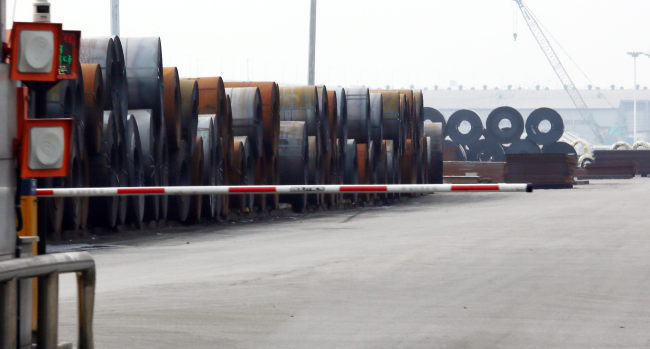Korea avoided the worst case scenario of being slapped with duties of up to 53 percent on steel exports to the United States, but it will invariably take a hit if fresh duties are put in place, industry experts said Friday.
US President Donald Trump said on Thursday that he would impose uniform 25 percent duties on imported steel to protect US producers, with a formal decision due next week.
The announcement could not have come at a worse time for Korean steel mills already struggling with rising import restrictions and intensifying competition from China.
Korea shipped 3.6 million tons of steel products to the US last year, becoming the No. 3 steel exporter after Canada and Brazil, according to the US Department of Commerce.

(Yonhap)
While major US trade partners like Canada, China and the European Union immediately threatened to take retaliatory actions, the Korean government remained cautious over its next move amid ongoing negotiations to amend the bilateral free trade agreement with the world's largest economy.
The steel tariff is the latest in a series of import restrictions by the Trump administration under its "America First" policy. Trump has said the open trade pact with Korea is a "very bad" deal that cost American jobs and increased US trade deficits in the manufacturing sector.
"Until the US government makes a final decision, we will actively reach out (to US officials and policymakers)," the Ministry of Trade, Industry and Energy said in a statement, after Minister Paik Un-gyu held a meeting to discuss countermeasures to the US move. Korean trade minister Kim Hyun-chong has been in Washington since Feb. 25 to meet with senior American officials, including US Trade Representative Robert Lighthizer, to discuss trade issues in the face of toughening import restrictions on Korean goods, including safeguard duties on Korean washers and solar panels.
Experts say oil country tubular goods will be affected most by the fresh duties, as these products are specially designed for oil and gas drilling in extreme environments and are heavily dependent on the US market.
OCTG is one of the fastest growing sectors in the pipelines market and Korean producers enjoyed a boom in the North American country's oil and gas industry in recent years.
Steel pipes accounted for 57 percent of Korean exports to the US in 2017, followed by steel plates with 32.2 percent, according to Seoul's trade ministry.
Industry officials say the new duties, in addition to the incumbent tariffs, would sharply raise prices of Korean exports, hurting their price competitiveness against American manufacturers.
In July 2014, the US Commerce Department levied 9.9 percent to 15.8 percent anti-dumping duties on OCTG imports from Korean steelmakers, including Hyundai Steel, Nexteel, Seah Steel Corp. and Husteel. Seoul appealed with thse World Trade Organization against the tariffs and won the case, but the US hasn't lifted them, even though the ruling was upheld in mid-January.
In 2016, the US slapped up to 65 percent of anti-dumping and countervailing duties on Korean cold-rolled steel plates by POSCO Co. and Hyundai Steel Co., shrinking their exports last year.
As the Trump administration's threat of imposing heavy duties has been circulating for months, local companies have been mulling ways to increase US production to evade heavy duties. But securing raw materials and the lengthy process of getting an approval from the US government for their local sales remain challenges for their overseas production, they noted.
"Our production lines are all in Korea, and we are considering moving some of them to the US," an official at Korean steelmaker Nexteel said, asking not to be named. "We have been also contacting clients in Southeast Asia, Canada and Japan to diversify the export market."
Trade experts say the government should make concerted efforts with other nations to come up with an effective strategy to put pressure on the Trump administration.
"It is somewhat assuring that the US didn't choose to impose tough duties on just 12 nations, but 25 percent of duties are still a burden to Korean steel makers," Jung Cheol, a trade researcher at the Korea Institute for International Economic Policy, said. "Korean companies need to consult with American clients to minimize the negative effect on the Korean industry."
The news of US steel duties dragged down shares of Korean steel producers on the Seoul bourse on Friday on concerns over their price competitiveness in the US market.
POSCO, the nation's top steelmaker, tumbled 4.15 percent shortly before noon, and Hyundai Steel, its smaller rival, slipped 2.8 percent.(Yonhap)





![[From the Scene] Monks, Buddhists hail return of remains of Buddhas](http://res.heraldm.com/phpwas/restmb_idxmake.php?idx=645&simg=/content/image/2024/04/19/20240419050617_0.jpg&u=20240419175937)
